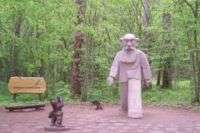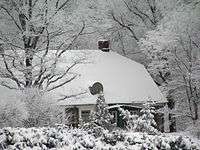Anna Brigadere
Anna Brigadere (October 1, 1861 in Tērvete – June 25, 1933 in Tērvete) was a writer, playwright and poet from Latvia.[1]


Biography
Her first story was published in 1896. In 1897, she turned her focus exclusively to literary work, and her first book Vecā Karlīne/Old Karlina was published. Six years later, her first and most popular play Sprīdītis/The Tale of Sprīdītis was written for the Riga Latvian Theatre director Jēkabs Duburs who staged the play in 1903. In 1985, the story was adapted for cinema, translated in several languages. World War I would lead her to emigrate to Moscow. In 1918 she returned to Riga and continued there her literary creation.[1]
Works
She wrote comedy and drama, among which The Tale of Sprīdītis, a young boy from a Latvian peasant family and his fantastic adventures in a nearby forest. She also wrote four autobiographies, among which Dievs, daba, darbs (God, Nature, Work) about the life of a Latvian woman in the late 19th century.
Awards and honors
- Anna Brigadere Prize was re-established in 1986 to celebrate achievements in Latvian literature.[1]
- 1932, The Culture Fund Prize for In the Harsh Winds
- 1927, The Culture Fund Prize for Lolita's Magic Bird
- 1926, The Order of the Three Stars.[1]
- 1913, Riga Latvian Society Award.
References
- "Latvian Literature". www.latvianliterature.lv. Retrieved 2019-12-23.
Bibliography
- Anna Brigadere un Tērvete / sastādījis Jānis Rapa. Rīgā: Preses Nams, 1996. ISBN 9984-00-226-8 (in Latvian)
- Zenta Mauriņa. Baltais ceļš : studija par Annu Brigaderi. Rīga: Zvaigzne ABC, 1996. ISBN 9984-04-304-5 (in Latvian)
- Meškova, Sandra (2002). Two mothers of Latvian literature: Aspazija and Anna Brigadere. Journal of Baltic Studies 34.3, 276-297.